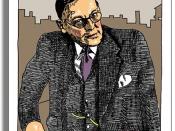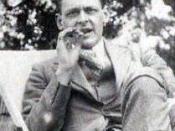Poetry must not stray too far from the ordinary everyday language which we useand hear' (T.S. Eliot). Discuss this statement in relation to ONE OR MORE poetsstudied on the moduleThe Metaphysical poetry of the seventeenth century is known for its use of wit. The emphasis is put on the intellect displayed by the poets in their complex conceits, arguably best advocated by Donne. I would be more inclined to Grierson's opinion that, "words such as "conceit" and "fantastic" do not sum up their quality at all." It is the sense of reality expressed using ordinary everyday language that makes the poetry successful. I would agree with T.S. Eliot that simplicity of language is vital, especially if that poetry is to survive for centuries. T.S. Eliot also said"Whether poetry is accentual or syballic, rhymed or rhymeless, formal or free, it cannot afford to lose contact with the changing language of common intercourse."The
accessibility of poetry for its audience is surely the most important aspect and so the overuse of elaborate and complex vocabulary can hinder a poem from being understood and therefore appreciated. This is especially relevant as the standards of education and levels of illiteracy during the seventeenth century meant that a large section of the population could not enjoy literature as the upper class and educated citizens did. I would argue that Herbert's poetry best emphasises Eliot's point of view through, "intense though quiet poems [that] embody his religious struggle or poignantly contrast mortality and eternal truth in a deceptively simple language" I will therefore explore in this essay how he achieves this.
Herbert addresses complicated religious and spiritual issues using simple language, accessible to all. The colloquial approach, simplicity of diction and the metaphors he draws from everyday experience are all part of his appeal.


